- Home
- Jeremy Robinson
Blackout ck-3 Page 5
Blackout ck-3 Read online
Page 5
Then, promptly at eight o’clock, the music ceased and a voice crackled from the public address system, directing everyone to gather in the casino. Immediately, people began streaming in from the deck, raising the ambient noise level in the room to a low tumult. King played out the hand in progress, standing on nineteen and winning, and then scooped up his chips and made his way through the milling herd to the stage where the musicians were putting away their instruments. A few moments later, the man himself-Graham Brown, aka: Brainstorm-ascended the dais with a wireless microphone in hand, and the room broke into spontaneous applause. King joined in, unenthusiastically patting his hands together as he studied the face of his nemesis.
9
Fiona had caught a final glimpse of the tall man entering the side entrance of the Louvre, but her attempt to follow was immediately thwarted by a security guard. He haughtily informed her, in halting and heavily accented English, that the ticket window at Passage Richelieu was closed and that entry was only possible at the Pyramid entrance or from the Carrousel du Louvre-an underground shopping mall that connected the museum with several other noteworthy landmarks.
“You let that other guy through,” Fiona had protested.
“Mr. Carutius? He has official business. He is not a tourist.” Like you. The guard had made no effort to hide his irritation at having to explain himself to a lowly American visitor, and a child at that.
“What kind of business?”
“He is the administrator of the special exhibit.” The guard then made a shooing gesture and stepped back to his post.
It had taken nearly half an hour for Fiona and Sara to make their way back around to Place du Carrousel and through the line to the ticket window; plenty of time for Sara to demand an explanation. It occurred to Fiona that King might not have told Sara about the man who now seemed to be calling himself “Carutius.”
“It’s Hercules,” she said simply. “You know about him?”
Sara’s expression was guarded. “You mean Alexander Diotrophes, the leader of the Herculean Society?”
So he has told her. “That was him I saw, going into the museum.”
Sara gave her a pinched expression. Fiona could sense the looming question, Are you sure? But instead Sara said, “The Louvre has one of the largest collections of antiquities in the world. It’s not so strange that Diotrophes would have business here. It’s got to be a coincidence.”
“Whenever he’s around, there’s trouble,” Fiona declared.
“That’s not exactly a compelling rationale for chasing after him,” Sara countered. Nevertheless, King’s girlfriend made no move to pull Fiona out of the line. Instead, when her turn came, she forked over fourteen Euros-as a minor, Fiona’s ticket was free-and grabbed a brochure containing a rough map of the complex.
“Where’s the special exhibit?” Fiona tapped her foot impatiently as Sara unfolded the pamphlet, flipped it around then back again. “Well?”
“Fi, there are half a dozen special exhibits: The Mariette Collection; the Da Vinci sketches; the relics of Saint Caesarius of Arles; the Bamiyan Buddhas…Where do you want to start?”
Fiona let out a low growl. “How should I know?”
Sara blinked at her impassively for a moment, but then seemed to grasp Fiona’s frustration. “Look, most of these exhibits are in the Sully Wing. That’s the closest section to us right now. We’ll work our way through them one by one, okay?”
Fiona nodded gratefully and walked beside Sara as they made their way from the lobby. Her eyes roamed the faces of museum patrons, searching for Hercules-Diotrophes, or Carutius or whatever he was calling himself-but there was no sign of the man. He would be hard to miss, standing a head taller than most men, with his distinctive hair and beard. Yet, as much as she was focused on her search, her eyes were drawn to the elaborate decor of the former royal palace and to the objets d’art displayed everywhere, which surprised her.
She’d never been particularly interested in classical art. Her own heritage had ingrained in her an appreciation for a much different style of expression, one that was to her way of thinking more honest, much more in harmony with the natural world and deserving of more honor than these paintings and sculptures with which the rest of the world seemed so enamored. But despite the fact that she had entered the museum for a very different reason, she found her gaze almost magnetically attracted to the displays and her pace began to falter.
She quickened her step, catching up to Sara as the latter reached the entrance to a gallery sporting a banner advertising the relics of Saint Caesarius of Arles. Sara ventured a few steps inside. “Big guy, right?” she said. “I don’t see him.”
Fiona did not answer. She knew she should be surveying the scattering of visitors, looking for Hercules, but she found herself unable to look away from a marvelous box of gold encrusted with jewels and positioned directly in front of the entrance. Something about the beautiful reliquary absorbed her attention, filled her with an almost transcendent euphoria…
“Fi?”
Fiona shook her head, breaking eye contact with the relic box, and the feeling receded. “No, he’s not here.”
“Let’s try the Da Vinci sketches, next.” Sara seemed not to have noticed the girl’s fascination with the reliquary. “That’s the kind of thing Diotrophes would be interested in, right?”
Fiona nodded dumbly and followed along, but she now kept her gaze on the floor, purposefully resisting the urge to visually take in her surroundings. She was only peripherally aware of the route Sara navigated, and in the back of her mind, it occurred to her that if they became separated, she wouldn’t have a clue how to find her way out. A few moments later, Sara stopped and Fiona looked up to see another gallery awaiting their inspection.
The large room was a veritable maze of freestanding display cases, each containing pages of vellum, adorned with delicate script and what looked like pencil sketches. Above the cases were enlarged reproductions of select images, the subjects ranging from detailed human figures to elaborate machines, and not a few bizarre creatures that looked to Fiona like they might contain hidden figures in the illustrated folds of skin and fur-like something from a child’s Find It puzzle. Fiona experienced a mixture of relief and disappointment as she gazed at the enormous prints; they did not produce the reaction she had felt in the other gallery.
And then her eyes fell on the original sketches.
She barely heard Sara say: “I don’t see him here, do you?”
Fiona worked her mouth, trying to form the question that had bubbled into her head but it was an effort. “Sara, you know your sensory whatever-it-is? How you can ‘see’ smells and stuff?”
Sara Fogg had been diagnosed with Sensory Processing Disorder; her sensory neural pathways didn’t always function the way they should, causing her to experience stimuli in unpredictable ways-to ‘smell’ colors or feel twinges of pain when seeing certain objects. Fiona had heard Sara and King talk about it from time to time, but she didn’t really understand the details.
“Sure.” A note of concern haunted Sara’s answer.
“Is it contagious?” Fiona pressed.
“Absolutely not. Fi, what’s wrong?”
Fiona gazed at the Da Vinci sketches, her eyes flitting back and forth as if trying to take all of them in all at once. The drawn images seemed to burst off the parchment and the carefully scripted notes glittered like magical runes in a Tolkien novel, imparting mystical knowledge that she could not read, but somehow intimately understood.
“I think I must have it too,” she said after a breathless moment. “Because these pictures are singing to me.”
10
Despite his stylish dinner jacket and immaculately coiffed silver hair, Graham Brown seemed no less banal a personage than he had in his first and only other encounter with King, in the remote Algerian villa where Sara Fogg had briefly been held prisoner.
Brown waited for the applause to die down before lifting the microphone and addressin
g the crowd. “Is everyone having fun spending my money?” he quipped, triggering a symphony of cackles and guffaws, and another round of clapping.
“Seriously folks,” he continued, sounding to King’s ear like a cut-rate stand-up comedian, “I don’t want to keep you from the festivities, but I just wanted to take this opportunity to thank you all for traveling here, from every corner of the globe, to take part in our little symposium.
“Power. It’s the reason we’re all here. And I’m not just talking about electrical energy. In times past, human society hungered for literal food, but now our greatest need is for the energy to drive our machines and our electrical devices. We have become entirely dependent on technology, and if the energy supply that makes it function were to be interrupted, it would be a disaster far worse than any famine or drought. Power, real power, belongs to those who can control the energy supply. And you, my friends, have that power.”
King listened attentively as Brown seemed on the verge of launching into a megalomaniacal diatribe, and he noticed others in the crowd murmuring uncomfortably.
“Or perhaps to put it more accurately,” Brown continued, softening his rhetoric. “You are the faithful stewards of that power. Society has entrusted the care and protection of its future to you, but make no mistake: it is a great responsibility. The power, of which I speak, does not rest with any one of us, nor with any man, nation or corporation. Nevertheless, it is something unscrupulous men might desire, and that is where we are vulnerable.
“I organized the Global Energy Future conference to call attention to this vulnerability. Our stewardship requires that we protect our trust-this great and potentially terrible power-from those who might seek to seize control for some dark purpose. As you are all doubtless aware, much of our power grid relies on early 20 ^ th century technology. The transmission of electricity through copper wires, for example, where ninety-nine percent of the energy is lost to resistance. The use of decades old computer systems for managing the grid. These are but two examples of challenges we must address if we are to meet the needs of the future.
“What we have done here this past week is merely to state the nature of the problem, but I’d like to think that we have also explored some possible solutions. Many of the technologies we’ve showcased are still in the conceptual phase. Others are presently too expensive to meet the demands of economic efficiency. Nevertheless, we must be willing to take some risks.
“It’s no coincidence that I have chosen to close the week’s activities with this casino event. Gambling is the perfect metaphor for the challenge we face. Will we play it safe? Stand on seventeen? Or will we take bold risks, losing sometimes, but in the end, winning the jackpot?
“I hope you will consider this metaphor as you return to your homes and your jobs. The safe bet, the status quo, is a slow path to failure. And the stakes are very high, my friends.”
Brown lowered the microphone, and on cue, the gathering clapped again, but this time the applause was more subdued, respectful rather than enthusiastic. The host however was not quite finished.
“Now, as a way of repaying you for having to suffer through my little speech, I have a little surprise.” Brown looked offstage and nodded to one of the stewards. “As I mentioned, there are some fantastic new technologies that aren’t quite ready for widespread distribution, but one of them is now ready for some real world field testing.”
As he spoke, a line of stewards trekked onto the stage and hastily deployed a folding table, upon which they deposited two elegant, covered, silver serving trays. When they had finished, Brown stepped behind the table and took a piece of paper from his pocket. “Would the following men please join me on stage?”
King’s curious musings about the contents of the serving trays were interrupted when he heard Brown speak the name of the man whose face he now wore. After overcoming his surprise and dismay, he jolted into motion.
As he moved onto the stage, King’s thumb brushed the ring on his third finger of his right hand, spinning the band around so that its decorative face was toward his palm. The ring, a Cold War-era spy gadget on loan from the CIA-probably from their museum-concealed the poison-tipped needle that would, if all went according to plan, take Brown permanently out of circulation. A gentle tap on the jeweled head-the pressure of a handshake or a squeezing grasp on the upper biceps, perhaps the result of an attempt to arrest a feigned stumble-would thrust the spring-loaded needle into its target.
He might not get this close to Brown again.
King played the scenario out in his mind as he strode forward. Too obvious, he decided. Too many people watching. He couldn’t afford to attract attention or raise suspicions. The boat was crawling with Alpha Dog security guards. The ring was his only weapon and it had only one dose of tetrodotoxin, just enough to bag the objective.
Be patient. You’ll get another chance.
Nevertheless, he could feel his skin burning with rage beneath the disguise as he passed behind Brown. The man had kidnapped Sara. He’d sent a hired killer after King in Arizona. And in his quest for- what exactly? — he’d very nearly eradicated all life on the planet, not once but twice.
But then he passed Brown and stood with the others-ten of them altogether-waiting to see what surprises the man had in store.
The host faced them, speaking once more into the microphone. “I’ve chosen you from the group because each of you manages a large power plant, and as such are in a unique position to benefit from my little gift.”
Plant managers, King thought. Was this part of Brainstorm’s master plan? Damn, I should have paid attention to the names.
With a flourish, Brown removed the domed covers to reveal ten small black rectangular boxes arrayed on swatches of red velvet. King blinked, tearing his gaze away from Brown, and glanced at the offering.
“Cell phones?” remarked one of the other men, with more than a trace of disappointment.
Brown smiled patiently and picked up one of the rectangles. “Appearances can be deceiving. This device may look like an ordinary cellular phone, but trust me when I say that it has as much in common with the iPhone or Droid in your pocket, as those devices do with an old-fashioned rotary dial telephone. Those devices have been called ‘smart phones.’ Well, gentleman, this…” He held it up, turning to the rest of the audience, “is a genius phone.
“It’s actually much more than just a telecommunications device. Don’t let its size fool you. Each of these little boxes holds more computing power than the mainframe networks that most of you are probably using at your plants.”
There were a few skeptical glances, but Brown continued without missing a beat. “Witness the next evolution of the computer: the quantum processor, courtesy of my new friends at Jovian technologies. Instead of using printed silicon chips, these devices carry out calculations at the atomic level. That’s how we’re able to get so much computational power into such a small package. But that’s only part of it. Quantum processing speeds also make it possible to utilize a remarkable new ‘stutter logic’ artificial intelligence interface.”
King raised an eyebrow at the mention of artificial intelligence, and recalled their original supposition about Brainstorm. Was that Brown’s game? Was he trying to create the independent computerized entity that he had, for so long, pretended to be?
“I can’t give you all the specifics,” Brown went on. “I’m not a ‘techie’ myself. But this AI application streamlines the user interface. No more logic errors or confusion about trying to figure out the correct sequence of operations. You just tell the computer what you want-it responds to either voice or text commands-and it can figure out what you’re really asking. It probably understands better than another human would.
“Gentleman, these devices aren’t just for checking your e-mail or downloading YouTube videos. With just one of these, linked to your existing mainframe, you could single-handedly run your power plants, at least insofar as the computerized systems are concerned. In fact, you c
ould do it from anywhere in the world.” Brown smiled, then after a thoughtful pause, added: “And of course, they are fully functional phones, too.”
“Oh great,” said one of the other men with mock sarcasm. “Wouldn’t you know it? I just signed a two-year contract with T-Mobile.”
Brown swept up the quantum phones and began distributing them to the men. “Not to worry. They are completely compatible with your existing phone carriers. The quantum processor can wirelessly synch with the phone you are now using-just hold it next to your phone, turn it on and tell it what you want to do.”
King watched as the other men eagerly followed Brown’s advice, and took out their personal phones. For his part, he simply dropped the new acquisition into his pocket where it joined the cigars he had pilfered earlier. Aleman would get a kick out taking the gizmo apart.
With the presentation of the quantum phones complete, the recipients began folding back into the crowd, eager to show off the unique devices. The men closest to Brown managed to buttonhole their host, and were expounding on some of their pet ideas for retrofitting the power grid. King lined up behind them, absently twirling the ring, and waited for his chance. A few interminable minutes later, he heard Brown excuse himself, preparing to move away.
King seized the opportunity, pushed past the other guests and stuck out his hand.
11
Less than fifty feet away, in a cramped room surrounded by flat screen monitors, Bandar Pradesh watched the live video feed of the ten power plant managers receiving their new quantum phones. He glanced to another monitor that displayed the status of the quantum network.
Brown had omitted mention of the fact that the phones themselves did not actually contain quantum processors, or rather, did not contain complete, independent processing units. In fact, it was a bit misleading to use standard computer jargon to explain the functionality of a quantum computer, but that was something Brown had never really been able to grasp. Like most people, the man was unable to conceive of a world that was not governed by Newtonian cause-and-effect mechanics. Conventional computers relied completely on principles of physical logic-if-then relationships, ones or zeroes-but quantum computers utilized an entirely different set of rules where those relationships had no meaning whatsoever.

 Alter
Alter From Above - A Novella
From Above - A Novella Flux
Flux Tether
Tether Exo-Hunter
Exo-Hunter Pulse
Pulse Cannibal
Cannibal Omega: A Jack Sigler Thriller cta-5
Omega: A Jack Sigler Thriller cta-5 Flood Rising (A Jenna Flood Thriller)
Flood Rising (A Jenna Flood Thriller) Viking Tomorrow
Viking Tomorrow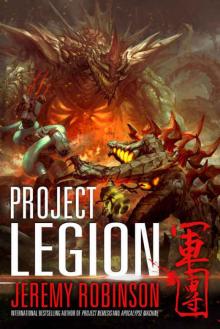 Project Legion (Nemesis Saga Book 5)
Project Legion (Nemesis Saga Book 5) BENEATH - A Novel
BENEATH - A Novel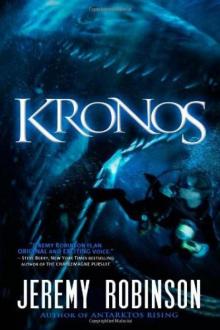 Kronos
Kronos SecondWorld
SecondWorld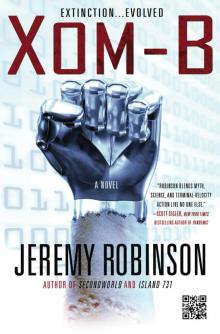 XOM-B
XOM-B Forbidden Island
Forbidden Island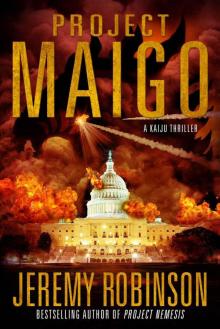 Project Maigo
Project Maigo The Last Hunter - Descent (Book 1 of the Antarktos Saga)
The Last Hunter - Descent (Book 1 of the Antarktos Saga) Jack Sigler Continuum 1: Guardian
Jack Sigler Continuum 1: Guardian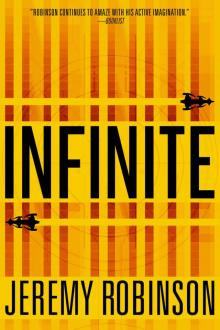 Infinite
Infinite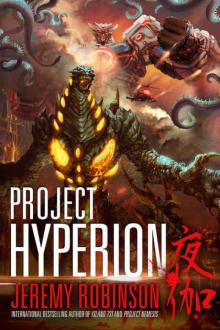 Project Hyperion
Project Hyperion The Distance
The Distance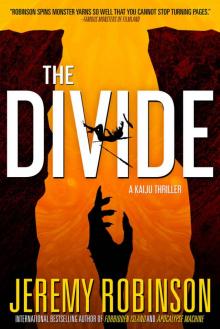 The Divide
The Divide The Last Hunter - Ascent (Book 3 of the Antarktos Saga)
The Last Hunter - Ascent (Book 3 of the Antarktos Saga) The Last Hunter - Pursuit (Book 2 of the Antarktos Saga)
The Last Hunter - Pursuit (Book 2 of the Antarktos Saga) Raising the Past
Raising the Past The Others
The Others The Last Hunter - Collected Edition
The Last Hunter - Collected Edition Threshold
Threshold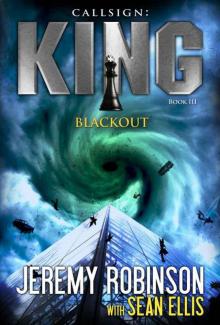 Blackout ck-3
Blackout ck-3 Antarktos Rising
Antarktos Rising Viking Tomorrow (The Berserker Saga Book 1)
Viking Tomorrow (The Berserker Saga Book 1) The Didymus Contingency
The Didymus Contingency Savage (Jack Sigler / Chess Team)
Savage (Jack Sigler / Chess Team)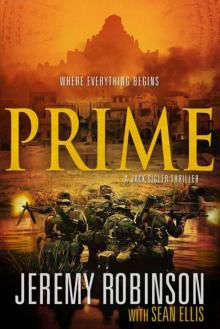 Prime
Prime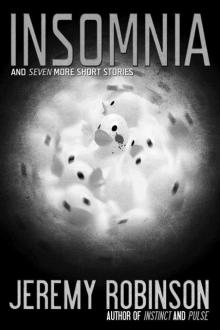 Insomnia and Seven More Short Stories
Insomnia and Seven More Short Stories Empire (A Jack Sigler Thriller Book 8)
Empire (A Jack Sigler Thriller Book 8) Unity
Unity Instinct
Instinct The Last Hunter - Lament (Book 4 of the Antarktos Saga)
The Last Hunter - Lament (Book 4 of the Antarktos Saga) MirrorWorld
MirrorWorld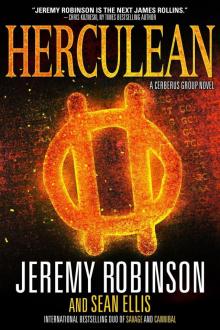 Herculean (Cerberus Group Book 1)
Herculean (Cerberus Group Book 1)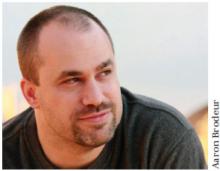 Island 731
Island 731 Omega: A Jack Sigler Thriller
Omega: A Jack Sigler Thriller Patriot (A Jack Sigler Continuum Novella)
Patriot (A Jack Sigler Continuum Novella) 5 Onslaught
5 Onslaught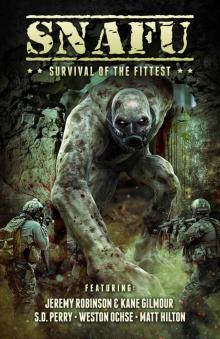 SNAFU: Survival of the Fittest
SNAFU: Survival of the Fittest Helios (Cerberus Group Book 2)
Helios (Cerberus Group Book 2)